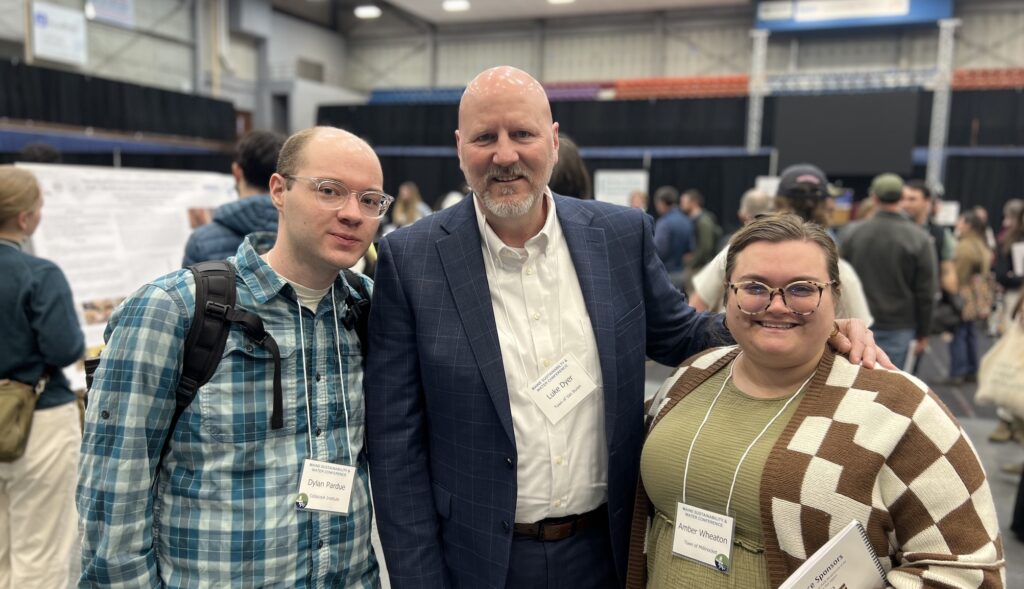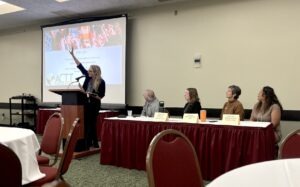History of MAINECAN
The Senator George J. Mitchell Center for Sustainability Solutions has supported the creation of MAINECAN in many ways and continues to serve as the hub for MAINECAN’s support team.
Connecting the Dots: Creating a Community Network for Energy and Climate Resilience
The following article by Mitchell Center writer Sonja Heyck-Merlin outlines the history of MAINECAN
From the St. John River in Aroostook County to Ogunquit Beach in York County, Mainers are facing the impacts of climate change: town piers destroyed by coastal storms, roads washed out from heavy rain, and cooling centers sprouting up in communities large and small.
In response, towns, cities, nonprofits, community groups, and individuals are increasing their efforts to build more resilient communities and reduce the greenhouse gas emissions that are contributing to extreme weather.
In Dover-Foxcroft, five residents have formed a climate action advisory committee. A vulnerability assessment undertaken by Phippsburg helps inform decisions about rising sea levels. In Portland, a nonprofit bicycle coalition supports climate-related legislation that advocates for making communities more bikeable.
When Sharon Klein, a UMaine associate professor in the School of Economics and faculty fellow at the Mitchell Center, talks about these community-driven efforts, she’s apt to use a dot metaphor. The dots are seemingly disparate groups, but Klein and her team at UMaine, have been working to connect them.

Although the network didn’t have an official name until 2024 — the Maine community-led Energy & Climate Action Network (MAINECAN) — for the past decade this network has been steadily building relationships across Maine.
“We’re basically focused on this big question of how statewide networks of communities that are taking action on energy and climate resilience can support each other in this process of achieving their own goals,” Klein said.
Early on, the Mitchell Center recognized the value of this network and provided administrative, financial, and advisory support. In 2023, Klein secured a four-year $1.1 million U.S. Environmental Protection Agency Science to Achieve Results (EPA STAR) grant to support research related to MAINECAN. This funding helped the network grow to more than 100 members before it was abruptly terminated on May 10, 2025.
It all started in 2015 when Klein got involved with WindowDressers, a Maine-grown nonprofit that supports community-led efforts to build wood and plastic window inserts designed to keep homes warmer, lower heating costs, and reduce carbon dioxide emissions. To her, the effort was comparable to a community barn raising. The project also had the benefit of getting Klein’s students out of the classroom and into the community.
As Klein joined the board of directors in 2018, and WindowDressers grew to serve Vermont, she saw how easy it was for Vermont communities to share knowledge through the Vermont Energy and Climate Action Network (VECAN). She knew Maine communities needed a network like VECAN.
Connecting with State Government
The idea of MAINECAN grew more salient and visible with the election of Governor Janet Mills, whose administration published Maine’s climate action plan in 2020. The goals of the plan included reducing greenhouse gas emissions and strengthening Maine’s resilience to the impacts of climate change.
In 2021, the Governor’s Office of Policy Innovation and the Future (GOPIF) mentored a team of students in Klein’s sustainable energy service learning class on a project that showcased municipal energy initiatives. This partnership led to a series of discussions with GOPIF and other interested parties about the need for a network like VECAN in Maine.
Then, GOPIF launched the Community Resilience Partnership (CRP) at the end of 2021. The program provides financial support to Maine communities seeking to reduce greenhouse gas emissions and prepare for the effects of climate change.
Klein jumped at the opportunity to learn what role the CRP might play in the VECAN-like network that she and other people across the state knew Maine needed. In an effort to learn-by-doing, she applied for a CRP Service Provider Grant to help the Passamaquoddy Tribe at Pleasant Point and Indian Township, as well as the towns of Millinocket and Eastport, enroll in the CRP.
It was important to Klein to ensure the Wabanaki Tribes and other rural communities in Maine would be able to access the benefits of the CRP because rural and Indigenous communities often experience the worst climate impacts and do not always have the resources or capacity to engage in climate planning.
After helping these four communities enroll in the CRP, Klein assisted them in submitting their first CRP Community Action Grant Proposals. For example, Millinocket’s first grant enabled them to install heat pumps in nearly all the town’s municipal buildings. Klein also supported their application for a second grant, focused on replacing municipal building windows with energy efficient alternatives.

“I attribute a significant portion of our success in the Community Resilience Partnership to the invaluable guidance and support provided by Sharon and her team. Their expertise and mentorship have been instrumental in helping us navigate the program and achieve our resiliency goals,” said Amber Wheaton, Millinocket’s community initiatives director.
Klein’s service provider work continued and expanded with the support of the EPA STAR grant. She now works with citizens and staff of five Wabanaki Nations in Maine through the Wabanaki Sustainable Energy Team (WSET) and seven rural Maine communities through the Community Sustainable Energy Team (CSET) to support them in achieving their energy goals. Many of these communities are now members of the CRP. They’ve also joined MAINECAN and have been instrumental to the network’s growth and development.
While MAINECAN and CRP goals often intersect, CRP’s main role is to provide financial support to local and Tribal governments for a specific set of energy and climate resiliency projects in alignment with the state climate plan. MAINECAN helps elevate this important work by communicating CRP opportunities to its members. And, it provides additional flexibility. For instance, the network can directly support community groups such as citizen committees and local nonprofits that may or may not be officially tied to a local or Tribal government. MAINECAN is also focused on peer-to-peer learning — helping community groups learn from each other and from all of the entities in Maine that want to help communities reach their goals, including but not limited to the CRP.
Discussions and collaborations with these supporting entities, which MAINECAN calls allies, positioned Klein and her colleague Caroline Noblet to lead a GOPIF-funded effort as part of Maine’s 2024 climate plan update. Through this research, they engaged over 2,800 people from rural communities and other groups that are especially vulnerable to climate change impacts to learn about their needs and concerns.
This work led to a report to the Maine Climate Council, which informed climate plan sub-strategies such as “Invest in Public, Active, and Shared Transportation and Build” and “Renovate More Housing that is Affordable, Energy Efficient, and Close to Vibrant Community Centers.”
“One of the biggest takeaways is that climate strategies really need to intersect with people’s basic needs — heating, cooling and transportation,” said Noblet, an associate professor in the School of Economics, Mitchell Center faculty fellow, and MAINECAN advisor.
These experiences underscore the importance of state and federal support for community initiatives. They also highlight the benefits of MAINECAN as an entity that is separate from state and federal government, as it helps keep community energy and climate resiliency initiatives relevant throughout changes in political priorities.
Connecting with Tribal Communities
Over the past seven years, Klein has developed relationships with citizens and government staff in Wabanaki Nations, leading to more recent efforts to survey and interview Tribal members about their opinions and preferences on energy options and climate adaptation.

In 2021, Klein hired Jasmine Lamb, a member of the Passamaquoddy Tribe, as an undergraduate student research assistant. She was tasked with co-developing an event at the Mitchell Center to build window inserts with Penobscot Nation Tribal members and conduct research about this pilot project. Lamb expanded this research to include the Passamaquoddy Tribe. She subsequently worked as a service provider assistant to Klein when enrolling the Tribe in the CRP. In their government resolution to join the CRP, the Tribe specified the creation of a citizen resilience committee as one of their priorities.
The experience inspired Lamb, and in 2022, she helped found the Sipayik Resilience Committee (SRC), whose mission is to advance energy sovereignty and climate resilience for members of the Passamaquoddy Tribe. The SRC is now a MAINECAN member, and Lamb, now a doctoral student studying tribal citizen resilience committees and social networks, has been instrumental in shaping the network.
This earlier work set the stage for the EPA STAR grant proposal, which was a collaborative effort among Klein, Lamb, the Penobscot Nation, and the Passamaquoddy Tribe. The grant supported the formation of the WSET. Since 2023, the group has met monthly with Klein, Lamb, and their research team to co-develop research that informs and supports each Tribe’s energy and climate adaptation goals and to coordinate intertribal funding proposals.
Part of this work involved hiring a Wabanaki sustainable energy coordinator in 2024, through a subaward from the EPA STAR grant to the Penobscot Nation. The coordinator, Kelsey Flores, serves the Wabanaki governments in Maine and their citizens in their sustainable energy goals. She is also a member of the WSET and MAINECAN. Together, the WSET, Klein, Lamb, and Flores have secured at least five successful intertribal grants. In addition, Lamb secured the Sunrise County Economic Council as a fiscal sponsor and raised over $400,000 for the SRC alone.
Connecting Even More Dots
In addition to the WSET and CSET members, many other communities have joined MAINECAN. For example, a group of volunteers called FreeportCAN is focused on solutions to prepare their community for possible climate disasters. Back in Dover-Foxcroft, the climate action advisory committee works to set up a cooling/heating center to help people cope with extreme temperatures. The Bar Harbor-based nonprofit organization, A Climate To Thrive (ACTT) supports Bar Harbor and neighboring communities on Mount Desert Island (MDI) in developing community-owned solar and many other community-led initiatives. ACTT has been a key partner in the development of MAINECAN since the beginning.
While primarily serving MDI communities, ACTT’s initiative called Local Leads The Way (LLTW) connects community groups across the state in a peer-learning network. Many LLTW members were early members of MAINECAN, and LLTW provides a critical resource to all MAINECAN members. The Center for an Ecology-Based Economy is another early MAINECAN partner that operates in a similar fashion. It started as a community group in Norway, Maine and grew to become a nonprofit organization that provides resources to MAINECAN member communities statewide.
Nonprofits, businesses, and state agencies that provide resources and direct support to community-led initiatives are encouraged to join MAINECAN as allies. Examples of existing ally members include ClimateWork Maine, the Maine People’s Alliance, Coastal Enterprises, Inc., GrowSmart Maine, the Appalachian Mountain Club, and the Sierra Club Maine. A list of many MAINECAN members can be found on their website. One of the ways the network attempts to facilitate collaboration and learning among members is by making it easier to find each other.
Meeting Mainers Where They Are
MAINECAN hosts an annual session at the Maine Sustainability & Water conference to bring people together and learn from each other. At the 2025 conference in March, MAINECAN members spoke about the importance of community-led initiatives and the need for more entities to engage directly with communities about energy issues and climate resilience. Members highlighted examples of community-led heat pump and home weatherization initiatives, as well as climate resilience measures such as community vulnerability assessments and community gardens.

It was evident that attendees were eager to build connections and engage with one another as they attempt to cope with and prepare for climate-related impacts such as flooding, heat waves, storm surges, wildfires, and other extreme weather events.
These relationships and knowledge sharing are especially important for towns that are eager to make energy upgrades and prepare their communities for the impacts of extreme weather but lack the time and resources to research funding opportunities and complete applications. Towns have also shared that they benefit from learning about how other towns planned for and implemented projects.
Despite the recent termination of the EPA STAR grant, the progress made during the grant’s first two years shows how strong MAINECAN has already become. The termination has stalled critical research, but the network will survive.
Members continue to forge ahead on community-led resilience projects and support each other’s efforts, filling gaps where possible. With reduced capacity and a smaller team, Klein will continue supporting the network by maintaining the website, seeking new funding, listening, and creating space for members to continue to build the grassroots community connections that are at the core of MAINECAN. This summer, MAINECAN members have been convening to discuss their governance, peer-learning among community coordinators, and developing home energy coaching programs.
“By connecting these dots, we hope to co-develop a strong web of shared resources and learning that spreads to all parts of the state, supporting all community goals related to sustainable energy and climate resilience, whether they initiate through grassroots or top-down processes,” Klein said.
Participants in the development of MAINECAN
Many people provided guidance and support throughout the early scoping days of MAINECAN. We thank them for their early engagement and ongoing assistance!
These advisors include: (Stay tuned for a complete list)
- Sharon Klein – Associate Professor of Economics, University of Maine
- Caroline Noblet – Associate Professor of Economics, University of Maine
- Jasmine Lamb – Sipayik Resilience Committee Chair, PhD Student in Ecology & Environmental Science, University of Maine
MAINECAN Timeline

